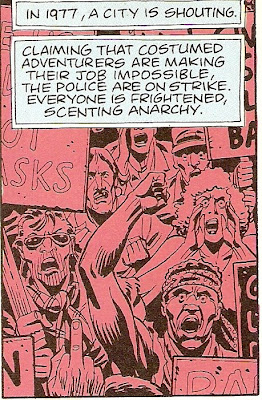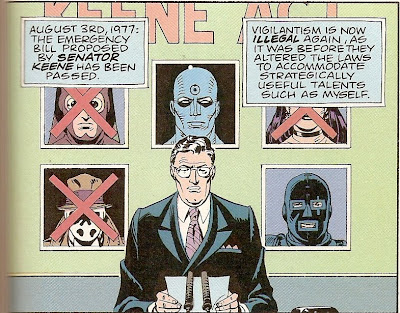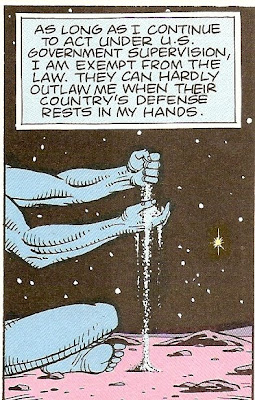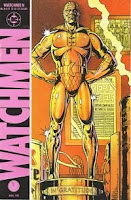One thing that always puzzled me a bit about Watchmen, even back in the day, was the Keene Act.
In the history of the Watchmen's America, in 1977 the police in New York City and Washington DC went on strike, "claiming that costumed adventurers are making their job impossible."
 As a result, the federal government rushed through the Keene Act, so "vigilantism is now illegal again, as it was before they altered the laws to accommodate strategically useful talents."
As a result, the federal government rushed through the Keene Act, so "vigilantism is now illegal again, as it was before they altered the laws to accommodate strategically useful talents."
And that's about all that Moore and Gibbons tell us. In this deeply detailed world, one of the most important story elements is really just glossed over, without a lot of explanation or detail.
Let's leave aside the question of federal involvement. After all, both Marvel and DC have, at various times, had the federal government step in and ban heroes...although nothing remotely on the scale of Stamford happens pre-Keene here, not that we know of. And we'll leave aside the issue of why a federal law is being enforced by local cops, and the only captured vigilante is put into a state prison. Where's the FBI? Shouldn't Rorschach be in federal custody?
Perhaps the more important question is, would we really have two cities (or were there more?) worth of police strikes and a massive federal intervention, over the activities of 3 non-powered dudes in masks?
 In 1977, Ozymandias had already been retired for a couple of years. Doc Manhattan and the Comedian are "exempt" from the Keen Act, because they "work entirely for the government."
In 1977, Ozymandias had already been retired for a couple of years. Doc Manhattan and the Comedian are "exempt" from the Keen Act, because they "work entirely for the government."

 Which means the police strikes, and the vast public hatred of masks, was somehow caused by Nite Owl II, Rorschach, and Silk Spectre II. These are the only heroes (aside from the "exempts") active in 1977, unless there's an awful lot Moore and Gibbons weren't telling us. The entire point of the police strikes and the Keene Act was just to ban 3 people? Really?
Which means the police strikes, and the vast public hatred of masks, was somehow caused by Nite Owl II, Rorschach, and Silk Spectre II. These are the only heroes (aside from the "exempts") active in 1977, unless there's an awful lot Moore and Gibbons weren't telling us. The entire point of the police strikes and the Keene Act was just to ban 3 people? Really?
The other thing to consider, is why the opposition to heroes? By 1977, masks had been operating for almost 40 years. There was nothing new here. Look at all the newspaper clippings and trophies in the background in the various chapters...masks operated with some level of acclaim and public acceptance. As late as 1962, they're having a "civic banquet" and "in gratitude" awards for Nite Owl I. For four decades masks had been tolerated, and even celebrated.
 So why, exactly, did the police suddenly find that masks were "making their job impossible?" There's not even a hint in the comics. During Veidt's mammoth 9,000-page Sorkinesque walk-and-talk exposition in issue 11, he opines that Doc Manhattan "somehow symbolized mankind's problems. As tensions rose, the elevation of costumed heroes became a descent...I foresaw that by the late Seventies, it would reach bottom." But that doesn't really explain a massive police strike. That still seems to beg some sort of precipitating incident, doesn't it? Some mini-Stamford, if you will, some event that lit off the powder keg.
So why, exactly, did the police suddenly find that masks were "making their job impossible?" There's not even a hint in the comics. During Veidt's mammoth 9,000-page Sorkinesque walk-and-talk exposition in issue 11, he opines that Doc Manhattan "somehow symbolized mankind's problems. As tensions rose, the elevation of costumed heroes became a descent...I foresaw that by the late Seventies, it would reach bottom." But that doesn't really explain a massive police strike. That still seems to beg some sort of precipitating incident, doesn't it? Some mini-Stamford, if you will, some event that lit off the powder keg.
(Before anyone suggests Veidt somehow manipulated events, I'd say that if he had done so, he certainly would have boasted about it in #11, as he brags about every iota of his life and plans. Seriously, the issue is 10,453 pages of self-aggrandizing exposition, a real-momentum killer...just in case you thought Watchmen in graphic novel form was perfect.)
Moore and Gibbons leave us to speculate for ourselves, then. Would the activities of 3 masks be enough to cause every cop to walk off the job?!? How was their job made impossible?
I've got a theory, backed by nothing but speculation. But Rorschach's kidnap case, the one that drove him around the bend, was in 1975. In those 2 years before the strikes, Rorschach was no longer "soft," and would kill many of the crooks he caught. So the police and the public would be confronted with a growing pile of bodies, and gazing into that abyss made them lose sympathy for all the heroes.
Still, there's no real spark, is there? But what if...what if Rorschach had beaten the crap out of, or even killed, an undercover cop, mistaking him for a perp? That would be spark enough, wouldn't it? And while we see Manhattan and the Comedian and Silk Spectre and Nite Owl dealing with the Keen riots, we never see Rorschach there...so we don't get his thoughts on the police strike, or the anarchy, or the causes. Hmmmm...
Just a theory, nothing to back it up. But seriously, can you see anything Nite Owl or Silk Spectre doing being enough to cause a police strike? We can only wonder, because the authors didn't clue us in...
In the history of the Watchmen's America, in 1977 the police in New York City and Washington DC went on strike, "claiming that costumed adventurers are making their job impossible."
 As a result, the federal government rushed through the Keene Act, so "vigilantism is now illegal again, as it was before they altered the laws to accommodate strategically useful talents."
As a result, the federal government rushed through the Keene Act, so "vigilantism is now illegal again, as it was before they altered the laws to accommodate strategically useful talents."And that's about all that Moore and Gibbons tell us. In this deeply detailed world, one of the most important story elements is really just glossed over, without a lot of explanation or detail.
Let's leave aside the question of federal involvement. After all, both Marvel and DC have, at various times, had the federal government step in and ban heroes...although nothing remotely on the scale of Stamford happens pre-Keene here, not that we know of. And we'll leave aside the issue of why a federal law is being enforced by local cops, and the only captured vigilante is put into a state prison. Where's the FBI? Shouldn't Rorschach be in federal custody?
Perhaps the more important question is, would we really have two cities (or were there more?) worth of police strikes and a massive federal intervention, over the activities of 3 non-powered dudes in masks?
 In 1977, Ozymandias had already been retired for a couple of years. Doc Manhattan and the Comedian are "exempt" from the Keen Act, because they "work entirely for the government."
In 1977, Ozymandias had already been retired for a couple of years. Doc Manhattan and the Comedian are "exempt" from the Keen Act, because they "work entirely for the government."
 Which means the police strikes, and the vast public hatred of masks, was somehow caused by Nite Owl II, Rorschach, and Silk Spectre II. These are the only heroes (aside from the "exempts") active in 1977, unless there's an awful lot Moore and Gibbons weren't telling us. The entire point of the police strikes and the Keene Act was just to ban 3 people? Really?
Which means the police strikes, and the vast public hatred of masks, was somehow caused by Nite Owl II, Rorschach, and Silk Spectre II. These are the only heroes (aside from the "exempts") active in 1977, unless there's an awful lot Moore and Gibbons weren't telling us. The entire point of the police strikes and the Keene Act was just to ban 3 people? Really?The other thing to consider, is why the opposition to heroes? By 1977, masks had been operating for almost 40 years. There was nothing new here. Look at all the newspaper clippings and trophies in the background in the various chapters...masks operated with some level of acclaim and public acceptance. As late as 1962, they're having a "civic banquet" and "in gratitude" awards for Nite Owl I. For four decades masks had been tolerated, and even celebrated.
 So why, exactly, did the police suddenly find that masks were "making their job impossible?" There's not even a hint in the comics. During Veidt's mammoth 9,000-page Sorkinesque walk-and-talk exposition in issue 11, he opines that Doc Manhattan "somehow symbolized mankind's problems. As tensions rose, the elevation of costumed heroes became a descent...I foresaw that by the late Seventies, it would reach bottom." But that doesn't really explain a massive police strike. That still seems to beg some sort of precipitating incident, doesn't it? Some mini-Stamford, if you will, some event that lit off the powder keg.
So why, exactly, did the police suddenly find that masks were "making their job impossible?" There's not even a hint in the comics. During Veidt's mammoth 9,000-page Sorkinesque walk-and-talk exposition in issue 11, he opines that Doc Manhattan "somehow symbolized mankind's problems. As tensions rose, the elevation of costumed heroes became a descent...I foresaw that by the late Seventies, it would reach bottom." But that doesn't really explain a massive police strike. That still seems to beg some sort of precipitating incident, doesn't it? Some mini-Stamford, if you will, some event that lit off the powder keg.(Before anyone suggests Veidt somehow manipulated events, I'd say that if he had done so, he certainly would have boasted about it in #11, as he brags about every iota of his life and plans. Seriously, the issue is 10,453 pages of self-aggrandizing exposition, a real-momentum killer...just in case you thought Watchmen in graphic novel form was perfect.)
Moore and Gibbons leave us to speculate for ourselves, then. Would the activities of 3 masks be enough to cause every cop to walk off the job?!? How was their job made impossible?
I've got a theory, backed by nothing but speculation. But Rorschach's kidnap case, the one that drove him around the bend, was in 1975. In those 2 years before the strikes, Rorschach was no longer "soft," and would kill many of the crooks he caught. So the police and the public would be confronted with a growing pile of bodies, and gazing into that abyss made them lose sympathy for all the heroes.
Still, there's no real spark, is there? But what if...what if Rorschach had beaten the crap out of, or even killed, an undercover cop, mistaking him for a perp? That would be spark enough, wouldn't it? And while we see Manhattan and the Comedian and Silk Spectre and Nite Owl dealing with the Keen riots, we never see Rorschach there...so we don't get his thoughts on the police strike, or the anarchy, or the causes. Hmmmm...
Just a theory, nothing to back it up. But seriously, can you see anything Nite Owl or Silk Spectre doing being enough to cause a police strike? We can only wonder, because the authors didn't clue us in...

8 comments:
I think there were more heroes active to make the Keene act passable in Congress. My guess is that Mason only wrote deeply about the ones he knew and worked with. Think about the two major comic universes - Marvel had the West Coast and Regular Avengers along with heroes all across the globe - XCaliber, Alpha Flight, etc.
Yeah, and to carry on with that analogy, the Avengers aren't the *only* heroes around, just the most famous heroes. If there were a *lot* of towns and cities with Rorschach imitators running around, you could see how that could be a problem....
But really, the odd part is that Moore and Gibbons don't elaborate at all, and it does stick out on re-reading, or especially in the movie, where it seems to come out of left field.
I wonder, could it be some peculiar Britishism at work? Police strikes and such are more common there, maybe there's a "connect the dots" pattern that a Briton would make more readily than an American?
Actually...it's as I've been saying for nearly a quarter of a century....the story just aint that good.
Fred--Well, as we've seen in recent days, in there's enough popular uproar, Congress will act rapidly on legislation effecting only a few people.
David--I've long wondered if the Brit/Euro influence was responsible--especially for the apparent lack of grokking the federal/state divide--and, as you point out, the labour actions.
Chris--Can't agree with you...I'm just picking nits.
And thank you Snell for picking a particularly interesting nit.
Jim
Come to think of it, in "Days of Future Past" (UXM #141-142, published in 1981, five years before Watchmen #1), the chain of events that resulted in Rachel's dystopian alternate future was kicked off by something as "little" as the assassination of a US Senator. Although Claremont had things move at a slower pace, with the first Mutant Control Act passed a year after the 1984 Presidential election (and then declared unconstitutional by the Supreme Court).
Menshevik--Wait a minute...the U.S. Supreme Court actually striking down something repressive in the Marvel Universe?!? That Claremont always was a dreamer...It does make you wonder where the Court was during Civil War and Dark Reign, though...
jehingr--I just found it very interesting that while the creators would go into so much detail they actually explain why men's fashions are the way they are...but give us next to no detail on one of the most important background details.
chain of events that resulted in Rachel's dystopian alternate future was kicked off by something as "little" as the assassination of a US Senator.
Something similar has happened in the Heroes TV show. A few people with powers cause a few problems and suddenly all of them are being hounded and locked up. Homeland Security comes to investigate, witnesses the death of one man at the hands of a superpowered individual, and agrees with what they are doing.
Heck, something similar happened in real-world America after 9/11 when, due to the actions of a few, all suspected terrorists could be held without trial.
I did get the impression in Watchmen that, prior to the Keene act, there were more costumed vigilantes than just the half dozen that we see. Plus I thought that the Comedian (and perhaps Doc Manhattan) only became government sanctioned after the Keene Act.
Still, as you say, Moore and Gibbons didn't make all this clear - or even mention it. I can see that if some masks caused a bit of trouble then the USA shown in Watchmen would decide to shut them down - it's just a pity that this "trouble" wasn't shown, however briefly.
Being a Brit, I can see how the police might protest if a bunch of masks went around doing their job (badly in many cases) and not following the proper procedure (probably leading to a whole load of convictions being thrown out of court). And again, being a Brit, this would probably result in strikes. Note that, at the time of writing Watchmen, Britain was in the midst of a well-publicised, country-wide miner's strike, which probably coloured Moore's writing.
And, being a typical Brit, the whole federal/state divide kind of escapes me. :-\
Post a Comment